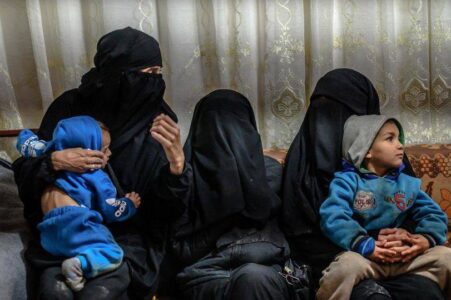
Uzbekistan repatriates nearly 100 Islamic State-linked women and children from Rojava
The Uzbek government repatriated nearly 100 of its citizens with alleged Islamic State (ISIS) links from northeast Syria (Rojava) on Friday, according to Kurdish authorities. Tashkent has previously brought home hundreds of its nationals from camps in Rojava.
A delegation from the Uzbek foreign ministry arrived in Rojava on Wednesday, meeting with Kurdish authorities to arrange the repatriation of 92 of their nationals. The group, 68 women and 24 children, are family members of ISIS fighters, according to a statement from Rojava’s foreign affairs office.
“According to the investigations that took place in the Autonomous Administration areas, no evidence has been proven incriminating them,” said Abdulkarim Omar, head of the office.
He said it is the policy of the Rojava administration to “hand over orphan children and some people with humanitarian cases who need treatment outside the region, after obtaining written consent from their mothers, because our laws do not allow us to separate children from mothers.”
Bahromjon Aloev, head of the Uzbek delegation, thanked Rojava authorities for their cooperation that made the repatriation possible, adding that they have previously brought home 240 Uzbek citizens, according to the statement.
Kurdish authorities in Rojava have struggled to manage tens of thousands of suspected ISIS fighters and their families, held in several camps since the terror group was militarily defeated two years ago. The largest camp, al-Hol, houses an estimated 61,000 people from dozens of countries, most of them family members of ISIS fighters. Another fewer than 2,500 are held in Roj camp.
The camps are a financial and security burden the Kurdish authorities say they cannot carry on their own. Omar renewed his office’s call for the international community to establish a criminal court to try ISIS suspects.
ISIS seized control of swathes of Syrian and Iraqi territories in 2014. It was territorially defeated in Iraq in 2017 and in Syria in 2019. However, remnants of the group continue to impose threats in both countries.
Almost half of the residents in al-Hol camp are Iraqis. Sheikhmus Ahmed, who supervises the administration of Rojava’s camps, told Rudaw English earlier in April that the Iraqi government has agreed to repatriate around 2,500 of its citizens.
Sherwan Alduberdany, an Iraqi MP, told Rudaw English on Friday that the government plans to bring a first group of 700 individuals to a camp south of Mosul on Sunday.
Source: Rudaw





